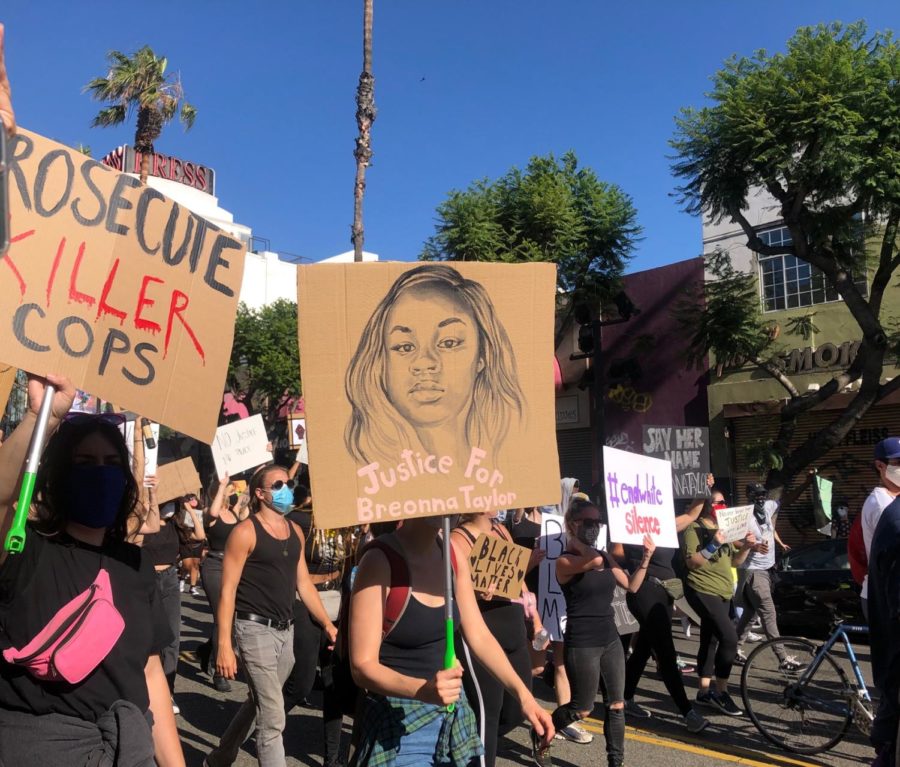Arrest of Derek Chauvin isn’t enough justice
George Floyd’s murderer, Derek Chauvin was arrested and charged for the unlawful death of George Floyd. However, one arrest doesn’t justify the justice of every Black victim who had faced the same force of police brutality.
June 1, 2021
It’s been one year since the murder of George Floyd and the recent conviction of his murderer has stirred up celebration.
Floyd’s murderer, Derek Chauvin, was found guilty of second-degree murder, third-degree murder and second-degree manslaughter on April 20. This verdict was met with overwhelming positivity, relief and celebration as if justice was served when in reality, this verdict was hardly justice but rather accountability.
According to Mapping Police Violence, a whopping 98.3% of killings by police end with the officer not being charged with any crime. Derek Chauvin’s arrest was a great outcome but there are still people out there who’s killers were not charged with their murders, like Breonna Taylor, Elijah McClain, Ma’khia Bryant, Stephon Clark and many more. There have been too many murders by police in which they haven’t been held responsible to call this one instance “justice.” After all, there is no justice as long as someone is dead. That being said, having these officers convicted is a good step. Unfortunately, that in itself is hard enough to achieve.
Even if it might seem like police reform is impossible at this point, a good place to start is to look at the causes of why it’s happening. In this case, why it’s so difficult to hold officers accountable for their crimes. One reason is due to the unavailability of police records.
The accessibility of police records differs throughout the U.S. by state but according to the Associated Press only 15 states have their police records, including misconduct records, mostly accessible to the public. Since most states either have their records mostly closed off or completely restricted, it has allowed officers with violent histories to easily be re-hired at other police departments.
Another reason why it’s nearly impossible to hold an officer responsible for wrongdoing is due to qualified immunity. Qualified immunity protects officers from having legal action taken against them unless the plaintiff can prove that the officer “violated a clearly established statutory or constitutional right.” This means that officers can get away with using unnecessary force or abuse of power if there was not an instance in the past where an officer committed that same violation. It makes taking civil actions against officers and winning exceedingly difficult.
The biggest and most problematic cause for why it’s so difficult for officers to be charged for their crimes is because of police unions. Police unions don’t just protect their officers from being rightfully incarcerated, they almost completely prevent the reform of police forces. According to The Conversation, police labor organizations across the U.S. protect their officers from being held responsible through “multiple layers of contractual and legislative protections.” Due to civil service protections, bargaining agreements, Law Enforcement Officers’ Bill of Rights and more, officers are given more insurance than the average citizen suspected of a crime. Not only that, Police Unions dictate the extent their officers can be investigated for a crime. This means they can easily limit interrogations and how long the investigation goes on, protecting corrupt officers.
Some consider it a good thing that civil servants are protected but when taken advantage of, that protection can lead to a further corrupt system. That’s why it’s great that organizations have been forming police reform agendas and police reform acts since the death of George Floyd. Decrees like the George Floyd Justice in Policing Act of 2021, the Safe-T Act, newly implemented police misconduct tracking databases and some police unions themselves creating reform agendas are wonderful steps in the right direction, but they aren’t enough. Pushback against police reform legislation, that has yet to be passed, is evidence enough.
There’s still more to be done to prevent police violence and according to Business Insider, there are several ways to do so. Police reform requires the rewriting of police union contracts, to “eliminate language that limits officer accountability,” make police misconduct records available to the public so unlawful cops don’t get re-hired and the demilitarization of police, to help deter the amount of police violence. Advocacy for the passing of The Ending Qualified Immunity Act would be another amazing step.
To stop this cycle of police brutality, we need to directly address what’s protecting officers from accountability and work to hold them liable. At the end of the day, we all should come together as a community and ask for these changes because that’s how real justice should be served.


















